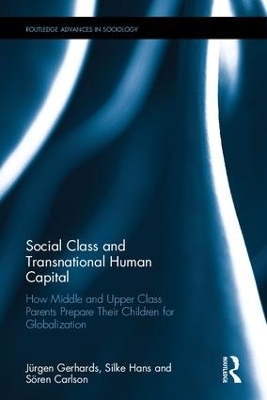
Social Class and Transnational Human Capital
Routledge (Verlag)
978-1-138-23202-0 (ISBN)
Within Social Class and Transnational Human Capital authors Gerhards, Hans and Carlson refer to these skills as ‘transnational human capital’ and ask to what extent access to this increasingly sought-after resource depends on social class. Based on Pierre Bourdieu’s theory of class, they investigate this question via both quantitative and qualitative empirical analyses. In doing so the authors focus, among other examples, on the so-called school year abroad, i.e. students spending up to a year abroad while attending school – a practice which is rather popular in Germany, but also quite common in many other countries. Thus, this insightful volume explores how inequalities in the acquisition of transnational human capital and new forms of social distinction are produced within families, depending on their class position and the educational strategies parents pursue when trying to prepare their children for a globalizing world.
An enlightening title, this book will appeal to undergraduate and postgraduate students, as well as postdoctoral researchers interested in fields such as sociology, social inequality research, globalization studies and educational studies.
Jürgen Gerhards is Professor of Sociology at Freie Universität Berlin. Silke Hans is Professor of Sociology at Georg-August-Universität Göttingen. Sören Carlson is Research Associate at the Department of Sociology at the Europa-Universität Flensburg.
1. Prologue
1.1 Setting the Stage: Transnational Human Capital and Social Inequality
1.2 Key Terms and Theoretical Framework
1.3 The Current State of Research
2. Changing Contexts: The Growing Demand for Transnational Human Capital and the Middle and Upper Class Quest for Distinction
2.1 The Growing Relevance of Transnational Competences
2.2 Transnational Human Capital as a Way of Gaining Distinction
2.3 The Increasing Demand for Transnational Competences on the Labor Market
3. Social Background Makes All the Difference: Types of Capital, Class Position and Chances for Acquiring Transnational Human Capital
3.1 Why Some Students Get the Chance to go Abroad and Others do not
3.2 Minor Educational Decisions, Major Consequences: Foreign Language Acquisition in Pre-School Daycare Centers
3.3 Mobility Chances in Europe: How Country Characteristics Influence the Acquisition of Transnational Human Capital
4. Strategic Investments: Families’ Class Position and Their Educational Practices in Everyday Life
4.1 Step by Step: The School Year Abroad as the Result of a Multi-stage (Decision) Process
4.2 Three Types of Families: The Transnationally Accomplished, the Excluded and the Ambitious
5. The "Brokers": The Formation and Structure of a Social Field of Intermediaries of Transnational Human Capital
5.1 Internationalization and the Commodification of Educational Services
5.2 The Field of Intermediary Organizations for School Years Abroad
6. Does Going Abroad Early on Pay Off? Returns to Transnational Human Capital
6.1 Once Mobile, Always Mobile: The Tendency of the Rate of Profit to Rise
6.2 The Transformation of Transnational Competences into Other Types of Capital
6.3 How Societies Benefit from Transnational Human Capital
7. Epilogue
Appendix: Data and Methods of Analysis
| Erscheinungsdatum | 22.06.2017 |
|---|---|
| Reihe/Serie | Routledge Advances in Sociology |
| Zusatzinfo | 26 Tables, black and white; 19 Line drawings, black and white; 19 Illustrations, black and white |
| Verlagsort | London |
| Sprache | englisch |
| Maße | 156 x 234 mm |
| Gewicht | 453 g |
| Themenwelt | Sozialwissenschaften ► Ethnologie |
| Sozialwissenschaften ► Pädagogik ► Allgemeines / Lexika | |
| Sozialwissenschaften ► Pädagogik ► Bildungstheorie | |
| Sozialwissenschaften ► Soziologie ► Makrosoziologie | |
| ISBN-10 | 1-138-23202-5 / 1138232025 |
| ISBN-13 | 978-1-138-23202-0 / 9781138232020 |
| Zustand | Neuware |
| Haben Sie eine Frage zum Produkt? |
aus dem Bereich


